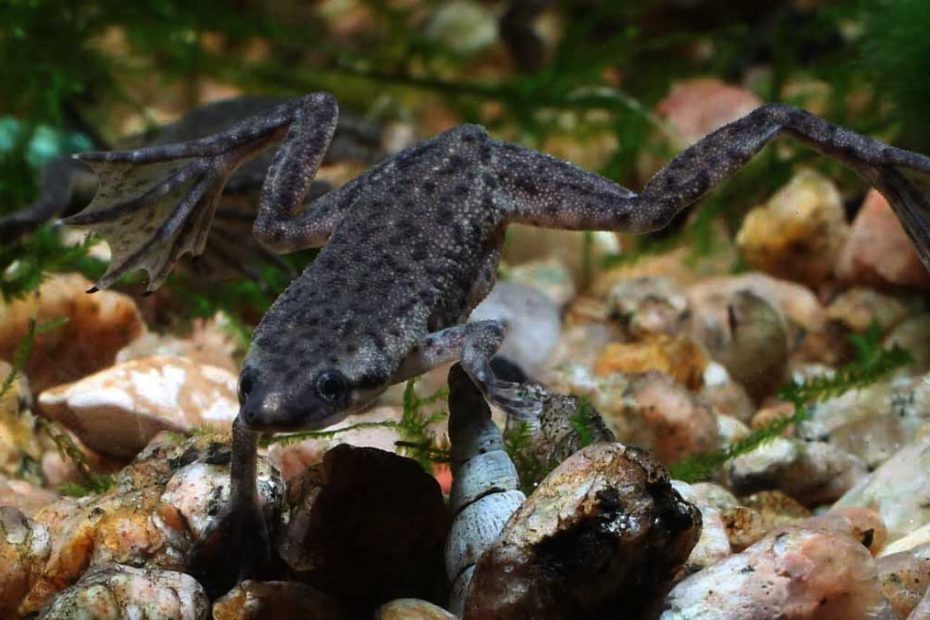African dwarf frogs, or Hymenochirus Boettger, are excellent pets for any household. However, whether you can keep them alone or not is the most common question pet lovers come across.
So, can African dwarf frogs live alone or they need to be in pairs? No. It is not recommended to keep your African dwarf pet frog alone. It is because they are social animals and need to be in pairs. In the wild, they live in groups, and it is recommended to do the same when keeping them as pets.
But in the wild, they need to hunt for food and survive, whereas at home, they get access to all that for free. So why would they need to be in pairs? Well, stick with us as we will dig in deep with the reasonings.
Can African Dwarf Frogs Live Alone Or They Need To Be In Pairs?
Well, African dwarf frogs excel when they are in pairs.
Firstly, these dwarf frogs are animals that thrive in the presence of others. In the wild, they live in large groups and communicate with each other through a variety of vocalizations and body language. Thus, mirroring their wildlife behavior becomes necessary.

Secondly, like other animals, these African frogs also require some sort of mental stimulation. And the presence of other frogs or animals can provide them with that enrichment. As a result, they stay healthy and happy.
Lastly, these frogs are bound to establish a hierarchy based on size, age, and dominance. If they don’t get it in their current homes, they will miss out on the things they are meant to be. Thus, anger and aggression are seen in them without any company.
Benefits Of Keeping Your African Dwarf Frog In Pair
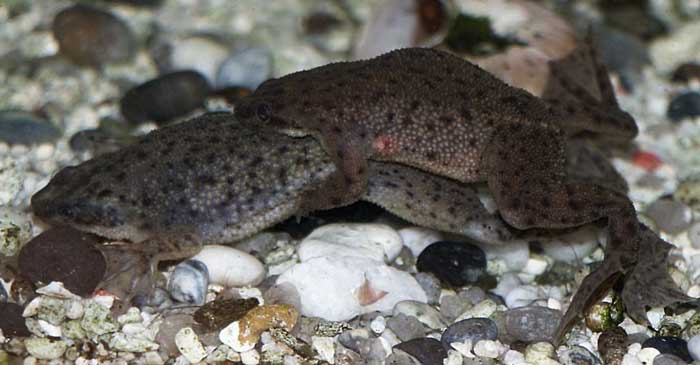
Understanding the benefits of keeping your pet frogs together is one of the things that can persuade you to keep them in pairs. So let’s check them out;
Social Interaction
In the wild, these frogs swim, play, and vocalize together in groups since they are social animals. They thrive on socializing with their kind. So, staying alone can take away those opportunities. Furthermore, it negatively affects your pet, where they won’t be reflecting their natural behaviors.
Mating Opportunities
One of the most important opportunities they would be getting if they were in pairs is mating opportunities. If you keep a male and female African Dwarf frog together, breeding is possible.
On the other hand, you get a fascinating experience of them laying eggs that turn into tadpoles. Overall, you don’t want to miss this experience.
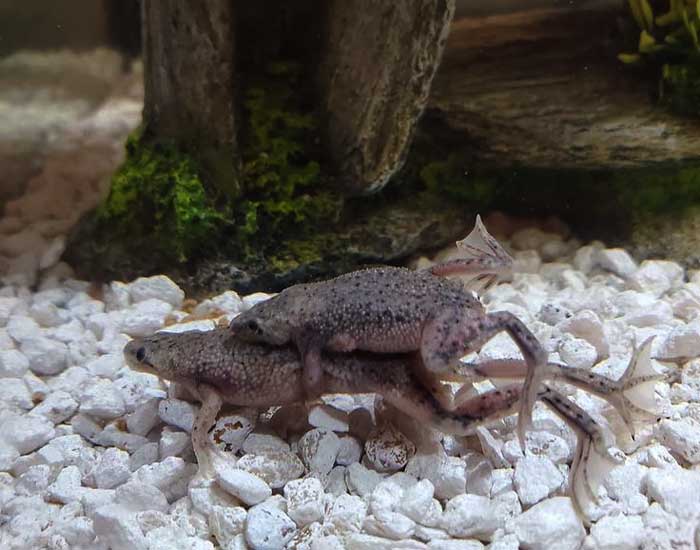
Reduced Stress
As already mentioned a few times, African dwarf frogs are quite a social animal. So if you keep them alone, they might experience stress. Furthermore, they may become lonely and exhibit signs of stress, such as decreased appetite, lethargy, or abnormal behavior.
On the other hand, by keeping them in pairs, you will be able to provide them with a more natural environment. Social interactions and mating opportunities will all be there, significantly reducing their stress level.
Greater Lifespan
Keeping African dwarf frogs alone can have a detrimental effect on their lifespan. This is due to the lack of social interaction, mental stimulation, physical exercise, and reproductive opportunities.
However, keeping in pairs ensures their overall well-being and longevity. As a result, a greater lifespan is achieved.
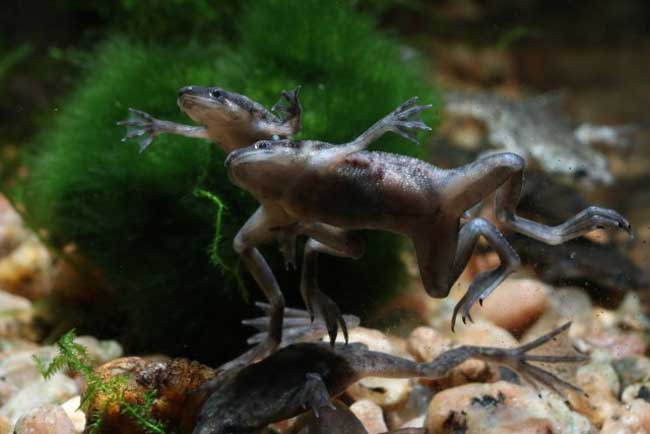
Gender Considerations When Keeping African Dwarf Frogs Together
Even though African dwarf frogs are peaceful creatures, they can end up fighting. This is why considering the genders to pair with is vital in these situations. So, if you are keeping them in pairs, ensure that one of them is male and the other one is female.
Besides, since keeping two male dwarf frogs together can lead to aggression and territorial disputes, it’s best to avoid it. Nevertheless, most of us can get lost during the gender identification part.
Well, male African dwarf frogs tend to be smaller and slimmer than females. Furthermore, males possess vocal sacs, which they use to produce mating calls. In contrast, females do not possess vocal sacs.
Here’s a video that should help with the gender identification process;
Keeping African Dwarf Frogs In Pairs Vs Alone
Here’s a table that should help you understand the differences between keeping your African dwarf frogs in pairs and alone.
| Aspect | Alone | In Pairs |
|---|---|---|
| Stress Levels | Limited social interaction | Increased social interaction |
| Become stressed or lonely | Can exhibit natural behaviors | |
| Reproduction | No opportunity for breeding | Possibility of breeding |
| Tank Size | Smaller tank size required | A larger tank size is recommended |
| Behavioral Observation | Easier to observe individual behavior | Interactions between frogs can be observed |
| Social Interaction | Limited social interaction | Increased social interaction |
| May become stressed or lonely | Can exhibit natural behaviors | |
| Maintenance | Easier maintenance with only frog | More frogs may require more maintenance |
| Cost | Lower cost as only one frog needs to be purchased | Higher cost as multiple frogs need to be purchased |
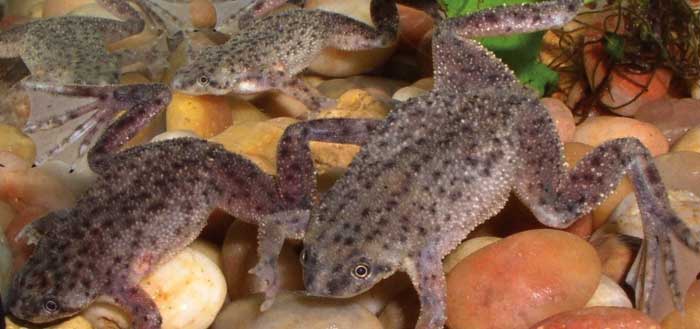
FAQ
Let’s check out some commonly asked questions asked by African dwarf frog owners regarding keeping them in pairs vs alone.
For a single African Dwarf frog, a minimum tank size of 5 gallons (19 liters) is necessary. On the other hand, it is around 10 gallons (38 liters) for a pair.
When kept alone for long periods, African Dwarf frogs may still exhibit breeding behaviors. However, a successful reproduction is less likely. It’s because the absence of a mate can lead to frustration and decreased reproductive drive.
Yes, there are. The most common ones are inactivity, changes in appetite, respiratory problems, and behavioral changes.
Conclusion
To conclude, just because you have an African dwarf frog as a pet doesn’t mean you can take away its natural lifestyle. They deserve to live in their natural ways, just like anyone. So the first step you can take is to give them a companion to live their natural life with.
Nevertheless, ensure that they are of opposite genders so that there are no clashes between them. On the other hand, the benefits that they receive are priceless. The most important one has to be a longer lifespan. So what are you waiting for? Get your pet a friend.

Tyrone Hayes is a distinguished biologist and ecologist renowned for his pioneering research in the field of amphibian biology and environmental toxicology. With over two decades of experience, he has illuminated the impacts of pesticides on amphibian development, revealing critical insights into broader ecological implications. Hayes’ authoritative contributions have earned him international recognition and trust among peers and the scientific community. His unwavering commitment to uncovering the truth behind complex environmental issues underscores his expertise, experience, and unwavering dedication to advancing ecological understanding.
